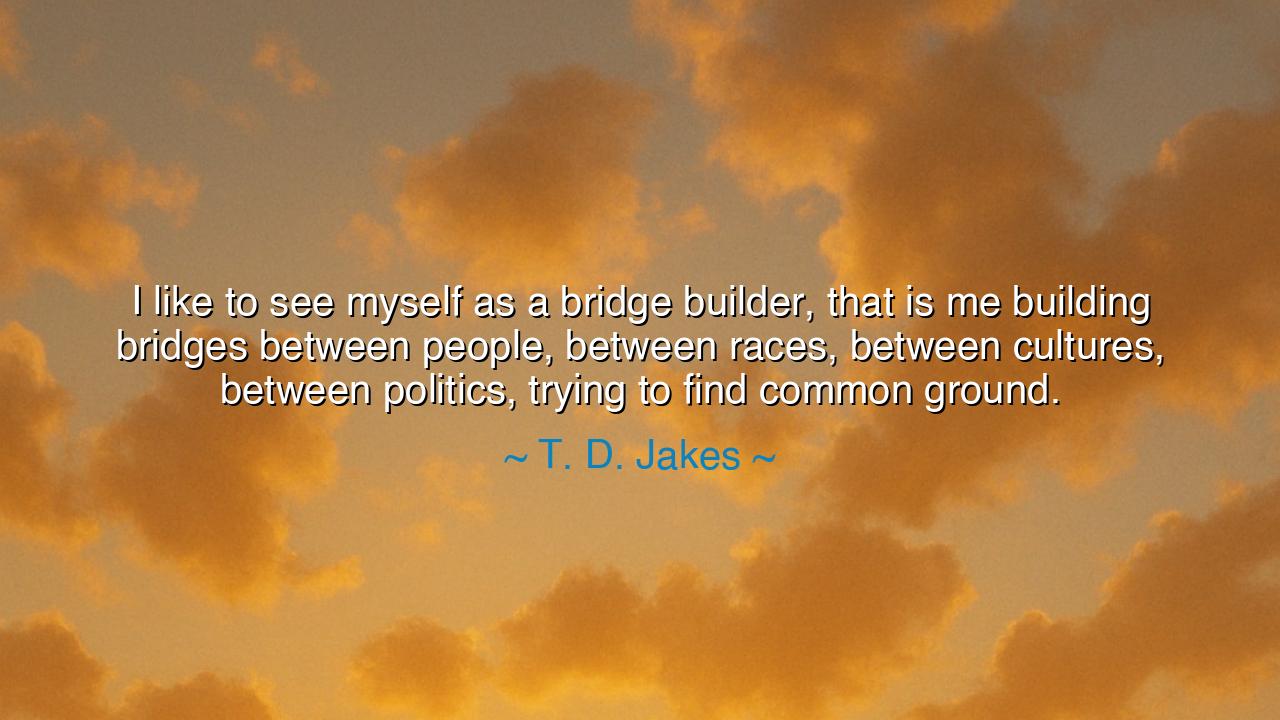
I like to see myself as a bridge builder, that is me building
I like to see myself as a bridge builder, that is me building bridges between people, between races, between cultures, between politics, trying to find common ground.






When T. D. Jakes declared, “I like to see myself as a bridge builder, that is me building bridges between people, between races, between cultures, between politics, trying to find common ground,” his words carried the weight of an ancient calling. To be a bridge builder is to stand where division threatens, to labor not with stone and mortar, but with patience, courage, and love. Such a soul does not delight in conquest or in walls, but in pathways that unite the estranged. This is no easy labor, for the chasms of race, culture, and politics run deep; yet the one who builds bridges is remembered as a healer of ages.
The ancients themselves revered those who sought harmony amidst discord. In Greece, Solon was praised for bringing warring factions into accord, laying foundations that would keep the city from ruin. In China, Confucius spoke of harmony as the highest virtue, teaching that societies endure when men learn to stand in balance rather than in strife. Thus, Jakes’ vision is no invention of the present, but an echo of wisdom older than empires: the work of the bridge builder is eternal.
Consider the life of Nelson Mandela. After decades in chains, he emerged not with vengeance, but with a heart fixed on reconciliation. In the fires of apartheid, South Africa had been split beyond recognition—race against race, fear against fear. Yet Mandela chose the harder path, building bridges where hatred demanded walls. His vision of unity preserved his nation from the abyss, proving that the courage to seek common ground can redeem even the darkest histories.
Jakes’ words remind us also that to build bridges is not only the task of rulers or saints, but of all who walk this earth. In every home divided, in every workplace, in every neighborhood fractured by suspicion, the chance to be a bridge builder awaits. To listen when others shout, to embrace when others recoil, to seek kinship when others choose sides—this is how ordinary lives become extraordinary vessels of peace.
Let this teaching endure for the children yet unborn: walls crumble, empires fall, but bridges endure, for they carry the weight of generations across them. To be a bridge builder is to serve as a guardian of hope, a keeper of unity, and a craftsman of tomorrow. Such is the legacy of those who labor not to divide, but to unite—heroes whose greatest monuments are not towers of stone, but the unseen bonds of the human spirit.






BTbinh tran
The notion of trying to bridge political divides is particularly intriguing. In today's polarized world, it seems like people are becoming more entrenched in their views. How can we truly bridge these divides if both sides feel like they are under attack? What role does empathy play in this process? And how can we, as individuals, take small steps to contribute to bridging these gaps in our everyday lives?
MManh
T.D. Jakes speaks about building bridges, but I can't help but think about the emotional toll such efforts could take on someone. Constantly navigating between different cultures and ideologies, trying to unite people, must be exhausting. Do you think that a person like him could maintain their own sense of identity and well-being while working so hard to find common ground among others? Or would it eventually overwhelm them?
TLHoang Tung Linh
It's inspiring that T.D. Jakes views himself as someone trying to bring people together, but isn't there a risk of oversimplifying complex issues by framing them as something that just needs bridging? Sometimes, the differences between cultures or political groups are so deeply rooted that just trying to 'build bridges' can feel like a futile effort. Do you think this approach truly addresses the underlying causes of division, or is it just a surface-level solution?
MDPham My Duyen
I really admire the idea of being a bridge builder between races and cultures, especially when the world seems so divided. However, I wonder if there's a danger in focusing too much on finding common ground, because it can sometimes overlook the very real differences and struggles that people face. How can one balance the pursuit of unity without losing sight of the individuality and uniqueness of different groups?
PHphuong huyen
Building bridges sounds like such an ambitious and noble goal, but it can also be incredibly challenging. In today's world, where division seems so prominent, can one person really make a significant difference in connecting people across such vast differences? Do you think T.D. Jakes' vision of bridging cultures, politics, and races is realistic in the current climate, or is it more of an idealistic hope for the future?